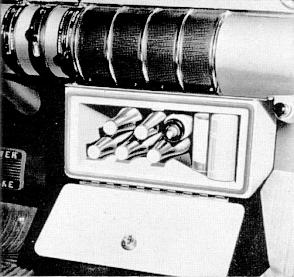|
collapse, of the trestle had to be timed to a
fraction of a second. Nothing could be left to
chance, There could be no trial runs, no rehearsals.
 "So the train was dragged across the trestle by
a cable you .don't see on the screen. It was hidden
between the rails at the top of the trestle. The
cable was attached to a winch that was geared to
move. the train at a speed of five feet per-second.
That way we dovetailed its run with that of the
motor that turned the pipe to wreck the
structure." "So the train was dragged across the trestle by
a cable you .don't see on the screen. It was hidden
between the rails at the top of the trestle. The
cable was attached to a winch that was geared to
move. the train at a speed of five feet per-second.
That way we dovetailed its run with that of the
motor that turned the pipe to wreck the
structure."
 The scene went off exactly as planned, with
the train rushing across the trestle which
collapsed immediately behind it. The effect cost
all of $40,000 to create and lasts about half a
minute on the screen: It was worth it. Todd
defies any readers to find one flaw in the scene
that would reveal it as a miniature. The scene went off exactly as planned, with
the train rushing across the trestle which
collapsed immediately behind it. The effect cost
all of $40,000 to create and lasts about half a
minute on the screen: It was worth it. Todd
defies any readers to find one flaw in the scene
that would reveal it as a miniature.

 Car Refrigerator Fits Under Dash
Car Refrigerator Fits Under Dash
 Easier to install than a car radio, a mechanical refrigerator mounts under the
center of the dashboard. In it, the motorist
can keep beverages and perishables cool
as he drives. It is excellent for families
traveling with bottle-fed babies. The refrigerator operates on power provided by
vacuum from the manifold, according to
the manufacturer. Gasoline from the fuel
tank is used as the refrigerant and is piped
into the carburetor after use. The price of
the unit is around $90. Easier to install than a car radio, a mechanical refrigerator mounts under the
center of the dashboard. In it, the motorist
can keep beverages and perishables cool
as he drives. It is excellent for families
traveling with bottle-fed babies. The refrigerator operates on power provided by
vacuum from the manifold, according to
the manufacturer. Gasoline from the fuel
tank is used as the refrigerant and is piped
into the carburetor after use. The price of
the unit is around $90.
|